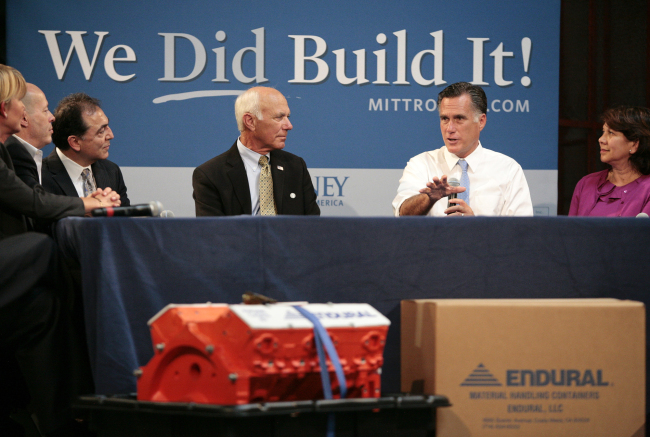Overseas trip will provide Romney with a chance to attack Obama’s foreign policy
WASHINGTON (AFP) ― White House hopeful Mitt Romney trades his bruising campaign battle with U.S. President Barack Obama for the world stage this week when he heads off to meet the leaders of Britain, Israel and Poland.
The six-day overseas trip, his first since clinching the Republican Party nomination in April, will provide Romney with a chance to attack Obama’s foreign policy while burnishing his own stature on the diplomatic front.
Romney will try to show Israel ― and Jewish voters back home ― that he would be a better friend in the White House than the incumbent and to reassure Poland after Obama scrapped recent plans for a missile defense system.
Obama’s re-election team pounced on the plans, painting their rival as a diplomacy neophyte and saying it was not time to “play politics” with U.S. foreign policy in places such as the Middle East.
The race has largely focused on domestic issues like the struggling economy, and Romney’s trip will temporarily shift attention to foreign policy, though his team insists there will be “no major policy pronouncements.”
“He is really abroad to learn and to listen,” Romney’s policy director Lanhee Chen said.
Chen described the voyage, which starts Thursday in London, as chance to show the value of “locking arms with our allies” and taking a “resolute stand with nations that share our values.”
But it’s also a bid ― as it was when Obama traveled to Europe in July 2008 ― to portray Romney as having the foreign policy chops for the job.
 |
Republican presidential candidate, Mitt Romney (right) hosts a small-business roundtable during a campaign stop at Endural LLC in Costa Mesa, California on Monday. (AP-Yonhap News) |
Romney has a tough act to follow. Obama was greeted like a rock star in July 2008 by a 200,000 crowd who gathered in Berlin to hear the then-senator speak.
And a visit by a Republican candidate may serve to remind Europeans of policy decisions by the last Republican in the White House, George W. Bush, something Obama campaign officials seized on Monday in a conference call.
“Given his lack of experience on these issues and his support for failed policies that were pursued during the Bush administration, I think this trip should be judged on the type of substantive ideas that Mitt Romney outlines,” former Obama press secretary Robert Gibbs told reporters.
The American people, he said, deserve to know “whether he would continue the proven policies of President Obama or return us to a time in which our foreign policy was a sore spot quite honestly in the world.”
Obama consultant Michelle Flournoy, a former top Pentagon official, pointed to Romney’s opposition to the timeline for U.S. withdrawal from Afghanistan, and wondered whether Romney would “double down on his opposition to the plan to end the war” when he meets British Prime Minister David Cameron on Thursday.
According to Romney’s campaign, the candidate will meet Cameron and top cabinet officials, as well as Labor Party leader Ed Miliband and former prime minister Tony Blair.
Romney will also attend the Olympics’ opening ceremonies on Friday, a move calculated to remind voters of his most successful foray to date into the global arena ― his stewardship of the 2002 Salt Lake City Winter Games.
He then travels to Israel to meet with Prime Minister Benjamin Netanyahu, President Shimon Peres and opposition leaders, and to give a speech.
He will also talk with Palestinian Prime Minister Salam Fayyad.
On July 30 Romney heads to Poland to meet its leaders as well as former president Lech Walesa.
In May 2011, Walesa, the icon of Poland’s 1980s anti-communist freedom drive, snubbed Obama, telling AFP at the time that a meeting “would only amount to a photo opportunity.”
Poland could serve as a platform from which Romney could hit out at Russia, a country the candidate has repeatedly labeled a key geopolitical foe.
Washington scaled back a U.S. missile shield planned for Poland, and critics say the move is a win for Moscow, which saw the system as a security threat.
It is perhaps in Israel where Romney could score the most points with U.S. voters.
Romney has consistently attacked what he says is Obama’s weak Middle East policy, saying the Democrat “threw Israel under the bus” in terms of defining the 1967 borders as a starting point for Israel-Palestinian negotiations.
And Romney has warned that Obama’s policy toward Iran is too weighted toward engagement with an Israeli enemy with nuclear ambitions.
Jewish voters supported Obama by about three to one against Republican nominee John McCain in 2008, and Romney needs to carry, for example, Florida, a swing state with a large Jewish population.
“If Romney can just slightly improve the GOP percentage in this segment of the electorate, he might have a better chance of carrying Florida,” said politics expert Professor John Pitney of Claremont McKenna College.








